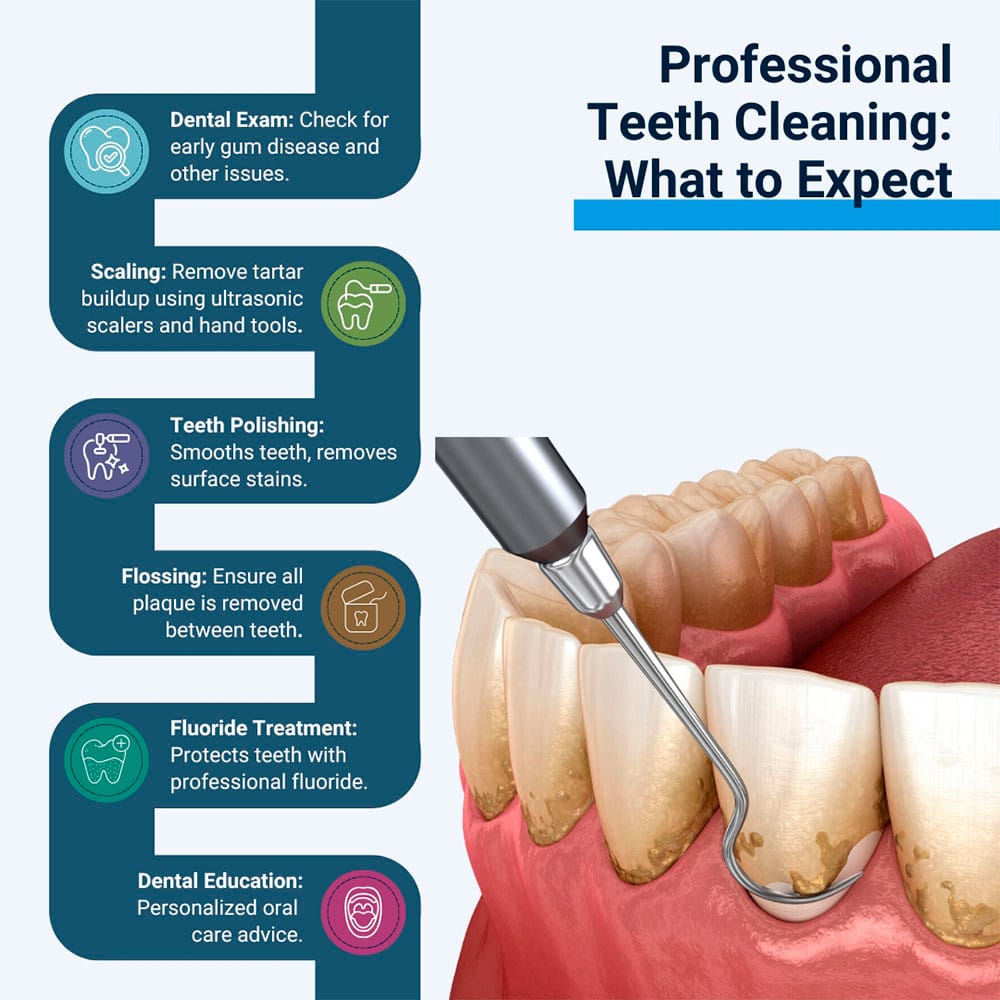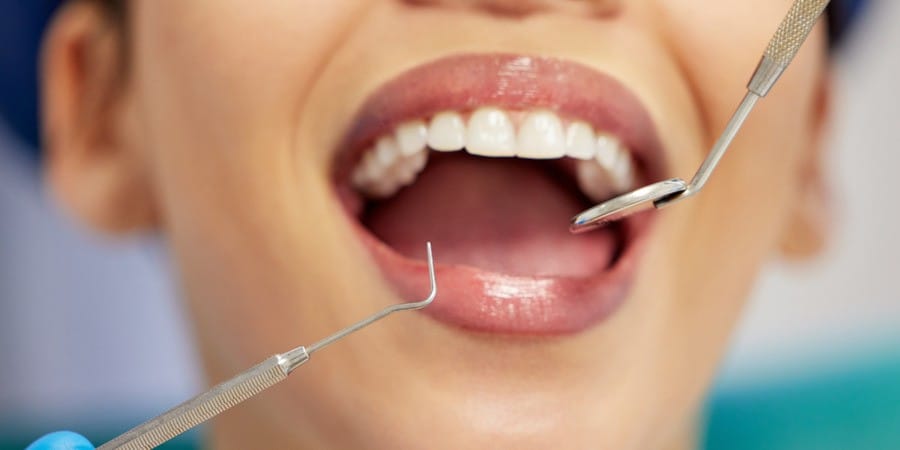Why Is Professional Teeth Cleaning Important?
Treatment is designed to remove all plaque and tartar (calculus) buildup. Even if you clean your teeth meticulously, some will still remain.
It only takes a couple of days for plaque to harden into tartar. You cannot remove tartar by regular brushing and flossing. It can only be removed during a professional dental cleaning.
Tartar tends to build up around your gum line and contains bacteria. These bacteria thrive on leftover food particles, producing acids and toxins as a byproduct. These can infect and inflame your gums and increase the risk of cavities.
Getting rid of plaque and tartar helps you maintain optimal oral health more easily. It is also a great treatment for freshening your smile and breath.
What to Expect During Your Professional Teeth Cleaning
A dental hygiene appointment is also sometimes called a scale and polish. The steps involved in professionally cleaning your teeth are outlined below.

Dental Exam
A professional dental cleaning begins with a dental exam. Our hygienist can examine your teeth and gums, checking for signs of early gum disease or other issues. If they detect any potential problems, they can discuss these with our dentist to ensure it is safe to proceed.
Scaling Your Teeth
Scaling is a process that will get rid of tartar buildup. The tartar can be loosened using an ultrasonic scaler and gently scraped away using special hand tools.
You will hear and feel the tartar being scaled, but it shouldn’t be painful. If you have significant tartar buildup, then this process will take longer.
Teeth Polishing
Once all the tartar or calculus is removed, our hygienist will carefully polish your teeth with a special gritty toothpaste. The toothpaste gently scrubs your tooth surfaces, helping to smooth and clean them thoroughly.
It’s a great treatment because it removes some surface stains. Once complete, your teeth will feel smooth and look a little brighter.
Dental Flossing
After polishing your teeth, our hygienist will carefully floss between each tooth. This is to check that all the plaque and tartar have been removed thoroughly. Once complete, you will rinse your mouth to remove any leftover debris.
Fluoride Treatment
We may suggest that you have a professional strength fluoride application to complete your treatment. Fluoride will harden tooth surfaces, helping protect them against cavities, and can be applied topically to your teeth as a gel, foam, or varnish.
Dental Education
As they clean your teeth, our hygienist can identify any areas of your mouth where you may not be brushing or flossing as well as you need to. They can discuss any concerns with you and provide useful advice on improving your oral care routine at home.
Not everyone will require the step, but it can be extremely useful. Your hygienist can show you how to brush thoroughly, perhaps using different techniques or a different toothbrush. They can also show you the right way to floss or discuss other tools to use instead.
How Often Should I Have My Teeth Cleaned?
Most adults with reasonable dental health will benefit from a professional cleaning every six months.
However, some people will need their teeth cleaned more frequently or may require a deep teeth cleaning treatment to help control conditions like severe gum disease.
We may suggest more frequent dental cleanings if you have any medical conditions that impact your oral health and increase the risk of cavities or gum disease. More frequent teeth cleanings can also be useful during pregnancy, particularly for anyone with gum disease or pregnancy gingivitis.
When you see our dentist for a checkup, they can provide you with a custom preventive dental care plan. This will show how frequently we would like you to see a hygienist for a regular teeth cleaning.
Does Teeth Cleaning Hurt?
A professional dental cleaning shouldn’t hurt. If it feels painful, please let us know, as we can always numb your gums to ensure the process is more comfortable.
What to Expect after a Teeth Cleaning
After having your teeth cleaned professionally, you may find that your teeth and gums are slightly more sensitive for a day or so.
Sometimes, your gums may slightly bleed when you brush or floss. If this happens, it’s important to persevere with brushing and flossing. You could have mild gum disease, and the best way to reverse this condition is with a professional dental cleaning and better oral care at home.
Ensuring you continue to brush and floss your teeth regularly will help you maintain the results of your teeth cleaning treatment for longer.
How Much Will Teeth Cleaning Cost?
A dental cleaning is inexpensive, and if you have dental insurance, it is almost certainly covered as it is an essential preventive dental care treatment.
The exact cost of your treatment will depend on the time required to scale and polish your teeth. The more plaque and tartar buildup you have, the longer your hygienist must spend on your treatment and the higher the cost. Even so, it is an affordable treatment and essential for good oral health.
For more information about teeth cleaning, please schedule an appointment with one of our excellent dental hygienists for a healthier and brighter smile. Our friendly team is here to help you.

